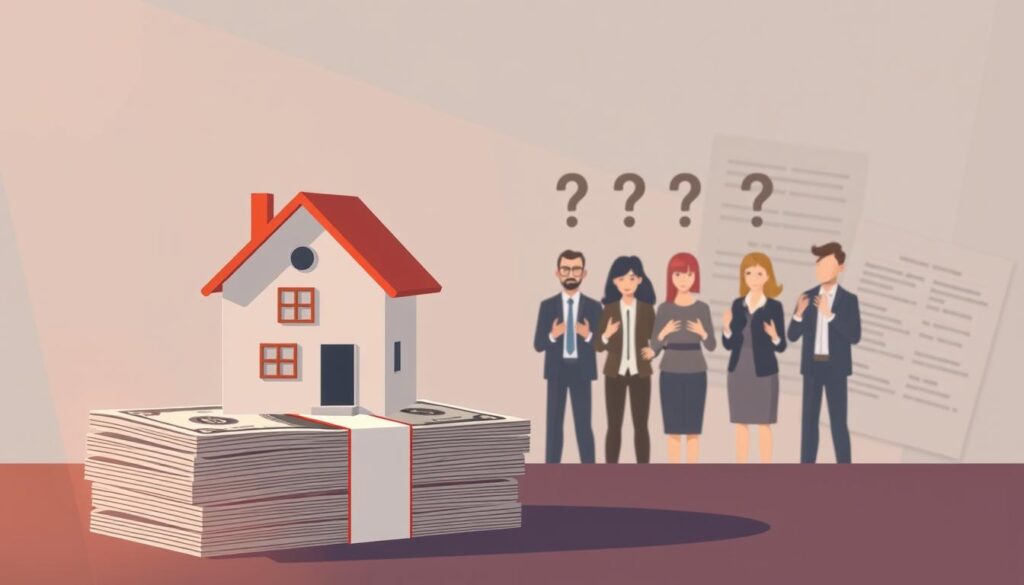Did you know over $6 trillion in home equity is untapped in American homes? This shows the huge potential of home equity and how to use it. Home Equity Agreements (HEAs) let you unlock your property’s value without more debt.
By selling a part of your home equity to an investor, you get cash. This way, you don’t have to make monthly payments. Exploring Home Equity Agreements, you’ll see how they can help you use your home’s value. This can make your financial life easier.
Understanding Home Equity Agreements
Home equity agreements (HEAs) let homeowners use their home’s value to get cash. This strategy involves selling part of your home’s equity to investors for a lump sum. It offers different ways to get funds without the usual debt.
What is a Home Equity Agreement?
A home equity agreement is a deal where you sell part of your home’s equity to an investor. You get cash for home fixes, debt payoffs, or personal projects. Investors bet on your home’s future value. This option is good for quick cash while keeping your home.
How Do They Work?
With a home equity agreement, you get cash upfront. The investor gets a lien on your property for a share of future value. You need at least 20% equity to qualify. The process is easy on credit, helping more homeowners.
Benefits of Home Equity Agreements
Home equity agreements offer many benefits, like getting cash without the usual debt. They help you understand your financial future better. These agreements give homeowners the freedom to use funds as they wish.
Accessing Cash Without Debt
One big plus of home equity agreements is getting cash without monthly payments. Unlike regular loans, you don’t have to worry about interest. This means you can use the money for big things like home fixes, paying off debt, or school.
Using your funds wisely is key to increasing your home’s value.
No Monthly Payments Required
Another great thing about home equity agreements is you don’t have to make monthly payments. This is good for keeping your finances stable while still getting cash. With a home equity agreement, you can handle your money better and focus on what’s important.
Using these tips can help you control your finances, even when things get tough.
| Benefit | Traditional Loans | Home Equity Agreements |
|---|---|---|
| Interest Accrual | Yes | No |
| Monthly Payments | Required | Not Required |
| Access to Cash | Limited | Flexible Use |
| Financial Pressure | Higher | Lower |
Who Can Benefit from Home Equity Agreements?
Home Equity Agreements are great for many people. They help you use the value in your home in smart ways. These agreements are made for different homeowners’ needs.
Homeowners Seeking Flexible Financing
Some homeowners can’t get loans because of bad credit or strict rules. Equity release options are a way to use your home’s value without monthly payments. This lets you get cash for big expenses like home fixes or school costs.
It helps keep you financially stable while you still own your home. You can handle urgent needs without getting into debt.
Individuals with Unstable Income
People with unpredictable income can benefit from Home Equity Agreements. This option doesn’t have the same strict rules as regular loans. It’s easier to get when money is tight.
By using your home’s equity, you can get funds when you need them. This helps you manage your money better without worrying about monthly payments.
Key Differences Between Home Equity Agreements and Traditional Loans
When looking at financing options, it’s key to know the differences between home equity agreements and traditional loans. The way you pay back and the interest rates can greatly affect your finances. Here, we’ll outline the main differences to guide you in making a smart choice.
Interest Rates Compared
Traditional loans have interest rates that change with the market and your credit score. These rates can affect how much you pay over time. On the other hand, home equity agreements don’t have interest rates. This means you can get cash without worrying about interest, which is great for those who value quick access to funds.
Repayment Terms and Conditions
Traditional loans require monthly payments until you’ve paid off the loan, including interest. This can be tough on your budget. Home equity agreements work differently. You only pay back what you agreed to when you sell your home or at the contract’s end. This gives you more freedom to use your home’s value without immediate repayment stress.
| Feature | Traditional Loans | Home Equity Agreements |
|---|---|---|
| Interest Rates | Yes, charged | No interest |
| Repayment Schedule | Monthly payments required | Repayment upon home sale or end of contract |
| Access to Cash | Limited by loan amount and equity | Access to funds without monthly payments |

How to Qualify for a Home Equity Agreement
Learning how to qualify for a home equity agreement is key if you want to use your home’s value. Homeowners need to gather the right documents and meet certain credit score standards. It might seem hard at first, but with some tips, it can be easier.
Necessary Documentation
To get a home equity agreement, you’ll need to show you own the property. You’ll need:
- Proof of ownership or title
- Details about your home’s current value
- Financial statements showing your income and debts
These documents help lenders decide if you’re a good fit for a home equity agreement. They might also do an appraisal to check your home’s value.
Credit Score Requirements
Home equity agreements are often more lenient than regular loans. They can accept credit scores as low as 500. This means more homeowners can get funding, even if they can’t with other loans. Look around to find a lender that fits your financial situation.
For more information, check out understanding home equity agreements. Knowing these basics will help you unlock your home’s value.
| Documentation Required | Purpose |
|---|---|
| Proof of Ownership | Verifies your legal rights to the property |
| Home Valuation Details | Establishes the current worth of your home for the agreement |
| Financial Statements | Gives lenders insight into your financial stability and ability to repay |
Steps to Secure a Home Equity Agreement
Getting a home equity agreement involves several steps. Knowing these steps can make the process smoother and more successful. Your journey begins with research, helping you make informed choices about your finances.
Finding the Right Provider
Looking for providers of home equity agreements requires careful thought. You should consider their terms, fees, and reputation. Start by making a list of potential providers from online searches or referrals.
Compare their offers to find one that fits your financial goals. Always read reviews and testimonials to learn from others’ experiences.
Understanding the Application Process
The application process for a home equity agreement is simple. You’ll need to fill out an application form and provide documents like proof of income and credit history. A home appraisal is also needed to value your property accurately.
Being ready with all the required documents can speed up your application. This makes the process easier for everyone involved.
| Step | Description |
|---|---|
| Research Providers | Look for reputable companies offering home equity agreements. Compare terms and fees. |
| Submit Application | Complete the application form and prepare necessary documentation. |
| Home Appraisal | A professional appraisal will determine your property’s value. |
| Review Terms | Understand the agreement terms before finalizing. |
| Close the Deal | Finalize the agreement and receive the funds. |
Potential Risks of Home Equity Agreements
Home equity agreements can be tempting for homeowners wanting to use their property’s value. But, they also come with risks. It’s important to know these risks to make smart financial choices. Market changes can greatly affect the value of your investment.
Market Fluctuations and Your Investment
One big risk is how market changes can affect your home’s value. When you sign an agreement, the amount you owe investors is based on your home’s future value. If the market drops and your home’s value goes down, you might owe more than your home is worth.
This situation can make it hard to settle the agreement, like if you want to sell your home. It adds stress to the selling process.
Impact on Future Home Sales
Home equity agreements can also limit your options when selling your home in the future. Since the investor has a lien on your property, selling before the agreement ends can be tough. You’ll have to work out the payoff terms with the investor, which can add stress.
This can make it hard to take advantage of good market conditions or personal reasons to move. It limits your flexibility.
| Risk Factor | Description |
|---|---|
| Market Value Dependency | Repayment amounts tied to future home valuation, exposing you to losses if market shrinks. |
| Selling Complications | Investor lien complicates home sale, requiring negotiation that can prolong the process. |
| Debt vs. Equity | Investors take a share in home equity, limiting your financial control in the long term. |
Real-Life Examples of Home Equity Agreement Success
Many homeowners have found great benefits in using home equity agreements. These stories show how people can use their home’s value for different needs.
Stories from Homeowners
A homeowner used a $50,000 advance to grow their bakery. They tied the repayment to their property’s future value. This made their finances more flexible.
Another homeowner paid off $45,000 in surgery costs with home equity funds. This smart move avoided high-interest loans. It’s a great way to handle medical bills.
How They Used Their Funds
Homeowners use home equity funds in many ways. Here are some common uses:
- Funding home renovations to increase property value.
- Consolidating high-interest debts to simplify payments.
- Catering to educational expenses, such as college tuition.
- Diversifying investments in promising markets.
- Managing daily expenses during retirement.
For example, one homeowner got a $50,000 advance. It could grow to $65,000 if their home’s value went up. This shows a big chance for financial gain with home equity.
The average American homeowner has over $207,000 in tappable equity. This highlights the wealth potential in these agreements. These stories show that using home equity offers many chances for financial stability. You can learn more about transforming your home investment strategy with informative resources.
Conclusion: Making the Most of Your Home’s Value
When you think about a Home Equity Agreement, it’s key to look at your finances first. Think about your income, plans for the future, and any debts you have. This helps you decide if using your home’s value is right for you.
It’s important to see how this choice fits with your long-term goals. Also, make sure it meets your immediate financial needs.
Evaluating Your Financial Needs
Before you start, think about how much cash you really need. Also, think about how you plan to use it. Knowing this helps you make a smart choice about using your home’s equity.
Being informed about your options lets you get the most from a Home Equity Agreement.
Next Steps for Interested Homeowners
If you’re thinking about this option, do your homework and talk to financial advisors. These steps will help you understand what’s next. You’ll be ready to use your home’s value wisely and secure your financial future.



